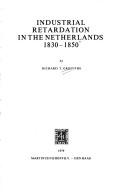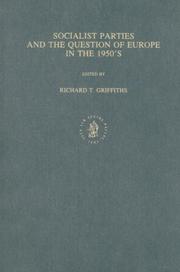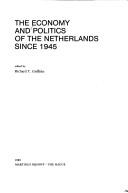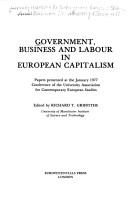| Listing 1 - 10 of 35 | << page >> |
Sort by
|

ISBN: 9024721997 9401718776 9789024721993 Year: 1979 Publisher: Den Haag Nijhoff
Abstract | Keywords | Export | Availability | Bookmark
 Loading...
Loading...Choose an application
- Reference Manager
- EndNote
- RefWorks (Direct export to RefWorks)
Much modern (Le. post-17S0) economic history is concerned with success in that a vast body of literature focuses its attention upon the experience of industrialisation and economic growth or upon relative differences in performance once the growth process is underway. The explanations advanced frequently hinge on those supply and demand factors, perceptible during the growth period itself, which may have helped or hindered economic progress. The problem which arises with this approach is whether those forces attributed with having pulled a country forward were the same as those which, in their absence, had held it back. For example, the growth of'inter national demand may be seen as a major stimulus in the economic development of a particular country, but its effectiveness as a stimu lant may have been contingent upon the prior removal of quite diffe rent obstacles to growth. In these circumstances it would be quite wrong to attribute lack of earlier development to the absence of international demand. Thus the study of a period preceeding discer nible growth in a sector of the economy may tell historians as much about the reasons for subsequent growth as a study of the growth period itself. This was my initial reason for choosing to research into the industrial development in the Netherlands in the first half of the nineteenth century: that it was an interval in economic history usually interpreted as one of stagnation, of missed opportunities and even of economic decline.
History of the Netherlands --- anno 1800-1899 --- Management --- Business & Economics --- Industrial Management --- Management Theory --- Pays-bas --- Industrialisation --- Conditions economiques --- 19e siecle

ISBN: 1903403219 9781903403211 Year: 2000 Publisher: London Federal Trust
Abstract | Keywords | Export | Availability | Bookmark
 Loading...
Loading...Choose an application
- Reference Manager
- EndNote
- RefWorks (Direct export to RefWorks)
European law --- anno 1950-1959 --- European federation --- European Union --- Construction européenne --- Union européenne --- History --- Histoire --- European Economic Community --- Europe --- Politics and government --- Politique et gouvernement --- History. --- 311 Staatsrecht --- Construction européenne --- Union européenne --- E.U. --- CEE --- Evropeĭskiĭ Soi︠u︡z --- C.E.E. --- Communauté économique européenne --- Comunidad Económica Europea --- Comunità economica europea --- EEC --- EC --- Europäische Wirtschaftsgemeinschaft --- Europejska Wspólnota Gospodarcza --- Europese Economische Gemeenschap --- Európai Gazdasági Közösség --- EHS --- Kurapʻa Kyŏngje Kongdongchʻe --- Kurapʻa Kongdong Sijang --- EEG --- Evropeĭska ikonomicheska obshtnost --- Evropské hospodářské spolecenstvi --- Comunidade Económica Europeia --- EWG --- Europæiske økonomiske fællesskab --- EØF --- Koinē Agora --- EOK --- MCE --- Mercado Común Europeo --- Europeiske økonomiske fellesskap --- Evropeĭskoe ėkonomicheskoe soobshchestvo --- MEC --- Evropska ekonomska zaednica --- EZZ --- Common Market --- Marché commun --- EĖS --- Avrupa Ekonomik Topluluğu --- AET --- Müşterek Pazar --- Ortak Pazar --- Sūq al-Ūrūbbīyah al-Mushtarakah --- Mercado Comum --- Europaikē Oikonomikē Koinotēta --- Evropska gospodarska skupnost --- Mercato comune --- EEZ --- Evropska ekonomska zajednica --- Euroopan Yhteisö --- EY --- EIO --- Shuḳ ha-Eropi ha-meʼuḥad --- Suq Komuni --- Eurōpaïkē Koinotēta --- Comunidade Européia --- Mercado Comum Europeau --- Unia Europejska --- Koinotēta --- E.G. --- קהילה האירופית --- קהילייה האירופאית --- שוק הארופאי המשותף --- Evropeisku Félagsmarknaðin --- EF --- European federation - History - 20th century. --- Europe - Politics and government - 1945 --- -European law --- -European federation --- CEE (European Economic Community) --- C.E.E. (European Economic Community) --- EEC (European Economic Community)

ISBN: 9071617041 Year: 1987 Publisher: Amsterdam
Abstract | Keywords | Export | Availability | Bookmark
 Loading...
Loading...Choose an application
- Reference Manager
- EndNote
- RefWorks (Direct export to RefWorks)
History of the Low Countries --- anno 1930-1939 --- Monetary policy --- -Devaluation of currency --- -NL / Netherlands - Nederland - Pays Bas --- 331.156 --- 333.421.1 --- Currency devaluation --- Money --- Currency question --- Monetary management --- Economic policy --- Currency boards --- Money supply --- Geldwezen van 1914 tot 1945. --- Gouden standaard. --- Devaluation --- Netherlands --- Economic conditions --- -Monetary policy --- -History of the Low Countries --- NL / Netherlands - Nederland - Pays Bas --- Geldwezen van 1914 tot 1945 --- Gouden standaard --- Devaluation of currency

ISBN: 9071617181 9789071617188 Year: 1990 Volume: 8 Publisher: Amsterdam NEHA
Abstract | Keywords | Export | Availability | Bookmark
 Loading...
Loading...Choose an application
- Reference Manager
- EndNote
- RefWorks (Direct export to RefWorks)
International economic relations --- Netherlands --- Europe --- Pays-Bas --- Unité --- 1945-1970 --- Relations extérieures --- Intégration économique --- Politique et gouvernement --- Relations

ISBN: 9004097341 9004625011 Year: 1993 Volume: 4 Publisher: Leiden ; New York : E.J. Brill,
Abstract | Keywords | Export | Availability | Bookmark
 Loading...
Loading...Choose an application
- Reference Manager
- EndNote
- RefWorks (Direct export to RefWorks)
Deals with an important aspect of the pre-history of the European Economic Community, namely the division in the 1950's between the West European socialist parties on the question of 'European integration'. Will provide a useful tool for the comparative study of the EEC.
Socialist parties --- Socialism --- Partis socialistes --- Socialisme --- History --- Histoire --- EEC / European Union - EU -Europese Unie - Union Européenne - UE --- 334.150.0 --- 329 --- Institutionele aspecten EG: algemeenheden. --- Politieke partijen. --- Political parties --- Politieke partijen --- Institutionele aspecten EG: algemeenheden --- Socialist parties.

ISBN: 9024790190 9024790492 9401713820 Year: 1980 Publisher: The Hague Martinus Nijhoff
Abstract | Keywords | Export | Availability | Bookmark
 Loading...
Loading...Choose an application
- Reference Manager
- EndNote
- RefWorks (Direct export to RefWorks)
There is relatively little information on The Netherlands written in the English language which is easily accessible to social science students and even less which is systematically assembled between the covers of a single book. This is unfortunate not only because The Netherlands is an important part of Western Europe but because the experience of The Netherlands in the way in which it has attempted to resolve the economic and political problems confronting it may help to shed valuable light on similar issues facing other European countries. The contributions for this volume were chosen with these considerations in mind. On the one hand the selection of topics was intended to provide an overall impression of the political and economic development of The Netherlands since the Second World War. Thus separate chapters are devoted to an examination of economic develop ment; counter-inflation, energy, regional and planning policies; pressure groups, electoral performance, cabinet formation and colonial and Euro pean policies. On the other hand, these areas for investigation were chosen to invite specific contrast with the experience of other European nations or to illustrate certain problems of political or economic theory. It is my pleasure to thank, first of all, the contributors themselves for the conscientious way in which they prepared their drafts which made my task as editor so much easier. Secondly, it will be apparent to even the most casual observer that I have contributed two chapters.
Business & Economics --- Economic Theory --- NL / Netherlands - Nederland - Pays Bas --- 334.152.0 --- 333.110 --- 331.31 --- 331.100 --- 330.581 --- 338.732 --- 331.102 --- 323.3 --- 323.5 --- 338.43 --- 333.846.0 --- 324 --- Betrekkingen tussen de Europese Gemeenschappen en de lidstaten: algemeenheden. --- Centrale banken en parastatale kredietinstellingen: algemeen. Overheidsbemoeiïng inzake organisatie en verdeling van het krediet. --- Economisch beleid. --- Economische geschiedenis: algemeenheden. --- Experimenten. Plannen. --- Gas. --- Geschiedenis van de kolonisatie. --- Politiek leven. Regeringscoalities en -crisissen. --- Pressiegroepen. Lobbying. --- Regionaal beleid. Industriële ontwikkeling en omschakeling van bepaalde regio's. Nieuwe industrieën. --- Verband tussen het monetair, bank- en kredietbeleid en de economische ontwikkeling: algemeenheden. --- Verkiezingen. --- Netherlands --- Economic conditions --- -Addresses, essays, lectures. --- Politics and government --- -Politics and government --- -Business & Economics --- -NL / Netherlands - Nederland - Pays Bas --- The Netherlands --- Pays-Bas --- Países Baixos --- Holland --- Spanish Netherlands --- Pays-Bas espagnols --- Austrian Netherlands --- Pays-Bas autrichiens --- Oostenrijkse Nederlanden --- Southern Netherlands --- Pays-Bas méridionaux --- Zuidelijke Nederlanden --- Niderlandy --- Belanda --- Nederland --- Koninkrijk der Nederlanden --- Reino dos Países Baixos --- Royaume des Pays-Bas --- Kingdom of the Netherlands --- Países Bajos --- Holanda --- Nederlân --- Hulanda --- Beulanda --- Niderland --- Niderlande --- هولندا --- مملكة هولندا --- Mamlakat Hūlandā --- Olanda --- Payis-Bâs --- Países Baxos --- Aynacha Jach'a Markanaka --- Nirlan --- Niderland Krallığı --- Kē-tē-kok --- Landa --- Kerajaan Landa --- Нидерландтар --- Niderlandtar --- Нидерландтар Короллеге --- Niderlandtar Korollege --- Нідэрланды --- Каралеўства Нідэрланды --- Karaleŭstva Nidėrlandy --- Nederlands --- Niadaland --- Holandija --- Kraljevina Holandija --- Izelvroioù --- Нидерландия --- Niderlandii︠a︡ --- Кралство Нидерландия --- Kralstvo Niderlandii︠a︡ --- Països Baixos --- Нидерландсем --- Niderlandsem --- Нидерландсен Патшалăхĕ --- Niderlandsen Patshalăkhĕ --- Nizozemsko --- Paesi Bassi --- Regnu di i Paesi Bassi --- Iseldiroedd --- Nederlandene --- Niederlande --- Kéyah Wóyahgo Siʼánígíí --- Nižozemska --- Kralojstwo Nederlandow --- Madalmaad --- Ολλανδία --- Ollandia --- Hollandia --- Κάτω Χώρες --- Katō Chōres --- Βασίλειο των Κάτω Χωρών --- Vasileio tōn Katō Chōrōn --- Nederlando --- Reĝlando Nederlando --- Paisis Bajus --- Herbehereak --- Herbehereetako Erresumaren --- هلند --- Huland --- Niðurlond --- Háland --- Paîs Bas --- Neerlande --- Ísiltír --- Ríocht na hÍsiltíre --- Çheer Injil --- Çheer y Vagheragh --- Reeriaght ny Çheer Injil --- Tìrean Ìsle --- Hò-làn --- Недерлендин Нутг --- Nederlendin Nutg --- 네덜란드 --- Nedŏllandŭ --- Hōlani --- Nederlandia --- Pais Basse --- Regno del Paises Basse --- Нидерландтæ --- Niderlandtæ --- Нидерландты Къаролад --- Niderlandty Kʺarolad --- Konungsríkið Holland --- הולנד --- Holand --- ממלכת ארצות השפלה --- Mamlekhet Artsot ha-Shefelah --- Walanda --- Hollandi --- Нидерландла --- Niderlandla --- Нидерландланы Королевствосу --- Niderlandlany Korolevstvosu --- Néderlandzkô --- Нидерланд --- Iseldiryow --- Ubuholandi --- Ubuhorandi --- Nederilande --- Нидерланддар --- Niderlanddar --- Uholanzi --- Ufalme wa Nchi za Chini --- Нидерландъяс --- Niderlandʺi︠a︡s --- Нидерландъяс Корольув --- Niderlandʺi︠a︡s Korolʹuv --- Peyiba --- Holenda --- Keyatiya Nederlandan --- Payises Bashos --- פאייסיס באשוס --- Nīderlandeja --- Batavia --- Regni Nederlandiarum --- Nīderlandes Karaliste --- Nyderlandai --- Nyderlandų Karalystė --- Paixi Basci --- Paes Bass --- Ulanda --- Holland Királyság --- Keninkryk fan 'e Nederlannen --- Reino di Hulanda --- Холандија --- Кралство Холандија --- Kralstvo Holandija --- Pajjiżi l-Baxxi --- Hōrana --- Недерлатт --- Nederlatt --- Оцязорксши Недерлатт --- Ot︠s︡i︠a︡zorksshi Nederlatt --- Нидерландын Вант Улс --- Niderlandyn Vant Uls --- Tlanitlālpan --- Huēyitlahtohcāyōtl in Tlanitlālpan --- Eben Eyong --- Nederlaand --- オランダ --- Oranda --- オランダ王国 --- Oranda Ōkoku --- Ulanna --- Nethiland --- Nederlande --- Holandska --- -323.3 --- Politiek leven. Regeringscoalities en -crisissen --- Pressiegroepen. Lobbying --- Verkiezingen --- Experimenten. Plannen --- Economische geschiedenis: algemeenheden --- Geschiedenis van de kolonisatie --- Economisch beleid --- Centrale banken en parastatale kredietinstellingen: algemeen. Overheidsbemoeiïng inzake organisatie en verdeling van het krediet --- Verband tussen het monetair, bank- en kredietbeleid en de economische ontwikkeling: algemeenheden --- Betrekkingen tussen de Europese Gemeenschappen en de lidstaten: algemeenheden --- Regionaal beleid. Industriële ontwikkeling en omschakeling van bepaalde regio's. Nieuwe industrieën --- Gas
Multi
ISBN: 9789087281717 9789400601079 9789400601086 9087281714 9400601077 Year: 2013 Publisher: Leiden Leiden University Press
Abstract | Keywords | Export | Availability | Bookmark
 Loading...
Loading...Choose an application
- Reference Manager
- EndNote
- RefWorks (Direct export to RefWorks)
This book collects contributions by Richard T. Griffiths on the history of European integration, some published for the first time in English. The essays range in chronology from the early experiences with the Marshall Plan to the difficulties and opportunities for the EFTA countries afforded by association with the EEC in the 1970s and 80s. The book interprets European integration far wider than simply the current European Union and its forerunners. Thus, it devotes chapters to EFTA, the OECD, and to issues as agriculture, cartels and monetary problems. The volume also contains the essay in the title which poses the question of what would have happened had there been no Schuman Plan back in 1950. This book should appeal to students of contemporary history, especially those interested in EU history, and to political scientists who will discover a rich palette of case studies upon which to test their theories. Its constructively critical slant on developments provides interesting perspectives to those general readers seeking a nuanced approach between the extremes of the current pro- or anti- in the debates on Europe.
History of Europe --- International relations. Foreign policy --- International economic relations --- European Union --- 334.150.0 --- Institutionele aspecten EG: algemeenheden. --- Institutionele aspecten EG: algemeenheden --- Essays --- History and criticism. --- Europe --- History. --- Contemporary History, Europe, European Integration, European Union. --- International economic integration. --- European Union countries --- Economic integration. --- Politics and government. --- International economic integration
Book
Year: 1966 Publisher: London: Constable,
Abstract | Keywords | Export | Availability | Bookmark
 Loading...
Loading...Choose an application
- Reference Manager
- EndNote
- RefWorks (Direct export to RefWorks)

ISBN: 0906039002 Year: 1977 Publisher: London Europotentials Press
Abstract | Keywords | Export | Availability | Bookmark
 Loading...
Loading...Choose an application
- Reference Manager
- EndNote
- RefWorks (Direct export to RefWorks)
Book
ISBN: 9789492439024 9789492439031 Year: 2017 Publisher: Leiden Hipe
Abstract | Keywords | Export | Availability | Bookmark
 Loading...
Loading...Choose an application
- Reference Manager
- EndNote
- RefWorks (Direct export to RefWorks)
Infrastructure --- Policy
| Listing 1 - 10 of 35 | << page >> |
Sort by
|

 Search
Search Feedback
Feedback About UniCat
About UniCat  Help
Help News
News